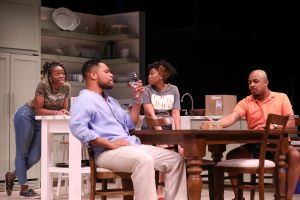In this concert, the Chamber Orchestra of the Triangle, under the direction of Lorenzo Muti took us to a quieter, calmer America. A place where there was time for reflection and contemplation, less rushed and less cluttered. Whether those were “the good old days” I cannot say. However, without any doubts, the music of Hunter Johnson, Aaron Copland and Samuel Barber brought the sweet taste of nostalgia as a welcomed feast to those in attendance on this spring-kissed day.
The program opened with a suite of music from Martha Graham’s 1940 ballet Letter to the World based on recitation of poetry by Emily Dickenson and the music of North Carolina composer Hunter Johnson. Johnson was born in 1906 on a farm over near Benson to which he returned after an active and successful career. He died there in 1998. His neoclassical/romantic style of composition was an ideal format as a complement to Dickenson’s wistful and sometimes enigmatic poetry.
Graham said of Letter to the World, “I conceived of two Emilys, dressed alike in white, who opened the ballet, each one entering from the opposite side of the stage. Throughout the dance the Emily who spoke would witness the other Emily, myself, who danced the inner landscapes of the poetry. The first lines as we faced each other were, “I’m nobody! Who are you? Are you nobody, too? Then there’s a pair of us…” Hunter’s music is familiar to the COT and Muti. They recorded it under their previous identity as the St. Stephen’s Chamber Orchestra on the Troy label. Also on the CD are works by Richard Rendleman, Walter Ross and Robert Ward. It may still be available from Albany Records as “Troy 111.”
Soprano Andrea Moore, now a member of the voice faculty at UNC-CH, was the guest artist for the performance of Samuel Barber’s “Knoxville: Summer of 1915.” It is a setting of approximately the last third of a prose poem by American poet and author James Agee. The poem is a nostalgic autobiographical text written in 1935 and later included as the prologue to Agee’s novel, “A Death in the Family.”
The portion of the poem set by Barber describes sitting in a rocking chair, watching people and traffic go by and ends up with his family, including aunts and uncles spreading quilts on the lawn and watching the stars “- wide and alive, they seem each like a smile of great sweetness, and they seem very near.” The sung text ends this way:
After a little I am taken in and put to bed.
Sleep, soft smiling, draws me unto her:
and those receive me, who quietly treat me,
as one familiar and well-beloved in that home:
but will not, no ,will not, not now, not ever;
but will not ever tell me who I am.
Barber’s music is sweet and simple (to the listener). Moore’s superbly controlled performance spoke of innocence and confidence mingled with awe and uncertainty. She employed almost no vibrato underscoring the youthful musings of the narrative. I was a little surprised to find tears on my cheeks at the end of this piece. It does not matter whether the setting is Knoxville or Cleveland or Durham, the words of Agee and the music of Barber and a performance as fine as this reminds us all that we are also part of that family laying on a quilt on the grass, gazing at the stars, wondering who we are. Amazing!
Copland’s Appalachian Spring also came into being as a Martha Graham ballet and has from the beginning been a classical landscape of early American pioneer life. It was first performed in 1944 at the Library of Congress in Washington, DC and won the Pulitzer Prize for music that year. The orchestral suite was extracted in 1945 in response to the work’s instant popularity. In 1954 at the behest of conductor Eugene Ormandy of the Philadelphia Orchestra, Copland arranged a suite for full orchestra.
The story tells of a pioneer couple establishing their life together in 1830s Pennsylvania. Building a farmhouse, planting, harvesting, celebrating are all expressed in the simple folk-influenced score. Near the end we hear the one actual folk-hymn Copland used. Indeed, he was almost obsessed with “Simple Gifts” and used it in many different settings. Here it is both a reverent and triumphant celebration of the achievement of life together.
In its original inception this program was to be titled something like “Orchestra and Dance.” However Roussel’s Le festin de l’araignée, Op. 17 was replaced by Barber’s Knoxville piece which may have been fortuitous in the final analysis. It gave us three works which fit the COT like hand in glove and the opportunity to hear the rich and vibrant voice of Moore. The orchestra under Muti’s care performed throughout the concert with affection for the music and such mastery of technical challenges that the wistful nostalgia of all three pieces was natural and eloquent. This was a concert to treasure as a reminiscence of our childhood wonder, our humble beginnings and our continual task to face up honestly to ourselves.












